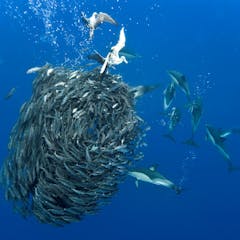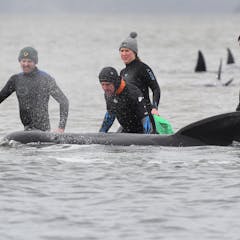
Articles on Marine biology
Displaying 41 - 60 of 173 articles

Frilled sharks haven’t changed for about 80 million years! And while they may look a bit like snakes from a distance, they are actually much more similar to other sharks close up.

The ocean is often considered a silent universe. But many recent studies highlight the importance of the soundscape for many marine species, both large and small.

With nine brains, blue blood and a talent for camouflage, the octopus is one of the most fascinating creatures in the sea.

Viruses do more than just cause disease – they also influence ecosystems and the processes that shape the planet. Tracing their evolution could help researchers better understand how viruses work.

The ocean is naturally noisy. Here’s what all the buzz is about.

There are some important issues to consider to best help marine species such as Atlantic puffins, bottlenose dolphins and orcas.

Among the dozens of endangered species, is a spiky snail named after The Clash lead singer, Joe Strummer.

The Blob, a long-lasting mass of warm water, sat off the Pacific coast of North America for years, bringing new species to formerly cold waters. What allows some to survive while others fade away?

When conditions are just right in some parts of the Indian Ocean, a type of bacteria will multiply and start to glow. Satellites are helping scientists study these milky seas for the first time.

Warm-blooded fish can swim 1.6 times faster than their cold-blooded relatives.

Ophiojura, discovered living on a seamount deep in the Pacific Ocean, is the last known survivor of a unique group of animals that diverged from its closest relatives way back in the Jurassic period.

Scientists watched in real time as rising ocean heat transformed the sprawling reef. It was a harbinger for ecosystems everywhere as the planet warms.

If octopuses simply started evolving a smarter brain, what stops them from ruling over humans? Why has this not happened already? An expert explains what these cephalopods might be capable of.

Microphones on the seafloor recorded life under the Antarctic ice for two years – inadvertently catching seal trills and chirps that are above the range of human hearing. Could they be for navigation?

There are more viruses in the ocean than stars in the Milky Way – and they’re fundamental to Earth’s biodiversity.

Rather than breathing in and out through the mouth, fish use a one-way system, passing water in one direction over their gills.

It’s time to listen to warnings from the people of the Pacific.

Hurricane Harvey destroyed the fishing infrastructure of Aransas Bay and reduced fishing by 80% over the following year. This removed humans from the trophic cascade and whole food webs changed.

Companies are eager to mine the deep ocean for valuable mineral deposits. But scientists are concerned about impacts on sea life, including creatures that haven’t even been discovered yet.

Towns and cities create an orange glow on the horizon at night. It’s so widespread that it even disturbs sea creatures.
